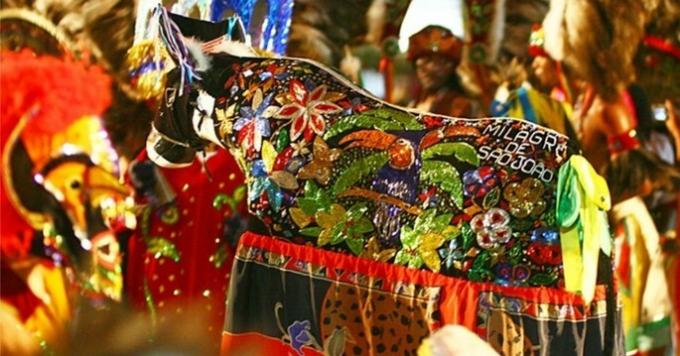Bumba meu boi, also called Boi-Bumba, is a traditional Brazilian dance typical of the North and Northeast regions.
Although it has greater representation in the cultures of these regions, we can currently find this cultural manifestation in all parts of Brazil.
In 2012, Bumba meu boi was included in the list of Brazil's Cultural Heritage by the National Historical and Artistic Heritage Institute (IPHAN).
Bumba parties my boi
Discover the main parties of Bumba meu boi.
Festa do Bumba meu boi in Maranhão
Inserted in popular culture, it is in the state of Maranhão that the festival of Bumba meu boi has the greatest representation, in celebrations to commemorate popular saints.
The party takes place in June and July, in São Luís, since the 18th century.

Below you will find more information about the cultural manifestations of Bumba meu boi in the state of Maranhão. This video is a presentation of the program. Expeditions, which brings together interviews, groups and accents.
Festa do Bumba meu boi in Amazonas
Also noteworthy is the city of Parintins, in the state of Amazonas, with the Parintins Folk Festival.
This is a festival celebrated annually in the city, since 1965.
As the Bumba meu boi festival is one of the most important folk festivals in the country, on June 30th, the National Day of Bumba My Boi.

History of the legend of Bumba meu boi
In the northeast, the story of Bumba meu boi was inspired by the legend of Mãe Catirina and Pai Francisco (Chico).
In this version, Mãe Catirina and Pai Francisco are a black couple working on a farm. When Mãe Catirina becomes pregnant, she wants to eat the tongue of an ox.
Eager to satisfy Catirina's wishes, Chico kills one of the oxen in the herd, which, however, was one of the farmer's favorites.
Upon noticing the lack of the ox, the farmer asks all employees to go out in search of him.
They find the ox almost dead, but with the help of a healer he recovers. In other versions, the ox is already dead and with the help of a shaman, he resurrects.
The legend, in this way, is associated with Catholicism's concept of the miracle of bringing back the animal. At the same time, it shows the presence of indigenous and African elements, such as the cure by the shaman or healer and the resurrection.
The party of Bumba meu boi is celebrated to commemorate this miracle.
Interested in learning more about folklore legends and myths? Be sure to read the texts below!
- Brazilian folklore legends
- Legends of the North Region that you need to know
- Unmissable Legends of the South Region
- Northeast Region Legends You'll Love
- Fantastic Legends of the Midwest Region
- Legends of the Southeast that you can't miss
Origin of Bumba meu boi
Bumba meu boi originated in 16th century Europe, more specifically in the Iberian Peninsula.
It is said that there was an Iberian tale with a plot very similar to the story of the legend of Bumba meu boi widespread in Brazil.
When it arrived in Brazilian territory brought by Portuguese colonizers, the story was modified to include some aspects of African and indigenous cultures.
It was during the colonial period, with slavery and cattle raising, that the legend associated with this manifestation had its origins as we know it today.
How about getting to know a little more about Brazilian culture?
- Northern Culture: know its wealth!
- Southeast culture: parties, dance, cuisine, myths and religion
- Southern Culture: parties, dances and much more
- Midwest culture: everything you need to know
Main features of Bumba meu boi
The party in celebration of Bumba meu boi includes dances, songs, parades and theatrical performance. Thus, colors blend in a festive, allegorical and popular atmosphere.

The music involves various instruments such as the guitar, the cavaquinho, the tambourine, the rattle, the triangle, the bass drum, the rattle, etc.
The predominant rhythm is called tune, a simple and regional style of song, formed by stanzas and rhymes.
In the theatrical presentation, the ox is the main character, but the farmer, the cowboy and his wife are also present.
This playful staging is characterized by the union of humor, satire, drama and tragedy. While the story of the ox is narrated by a narrator, the characters dance.
The plot revolves around the death to resurrection of the ox, and highlights human frailty, to the detriment of the animal's brute strength.
Note that in the story, the names of characters and their respective clothing may vary according to different regions of Brazil.
The first record of Bumba meu boi in Brazil took place in Pernambuco. However, the state where this cultural manifestation is most popular is Maranhão.
Want to know more about other cultural events in Brazil? Check out the contents below!
- Frevo: origin, characteristics and types of dance
- Catira or Cateretê: origin, dances and music
- Congada: origin, dance and party
Curiosities about Bumba meu boi
- In the state of Maranhão alone, there are more than 100 groups of Bumba meu boi and each one has its own peculiarities.
Due to its popular nature, the celebration of Bumba meu boi was already banned by Brazilian society between 1861 and 1868.
folklore quiz
Don't stop here! Toda Matéria selected a series of very rich texts on folklore to help you broaden your knowledge.
- Carimbó: origin, types, instruments, clothes, choreography and music
- Afoxé: rhythm, instruments, origin and characteristics
- Quadrilha: origin, dance, music and characteristics
- Samba de Roda: origin, characteristics, dance and music
- Círio de Nazaré: the biggest religious festival in Brazil
- Source of popular expressions you need to know
- The Folia of Kings in Brazil



